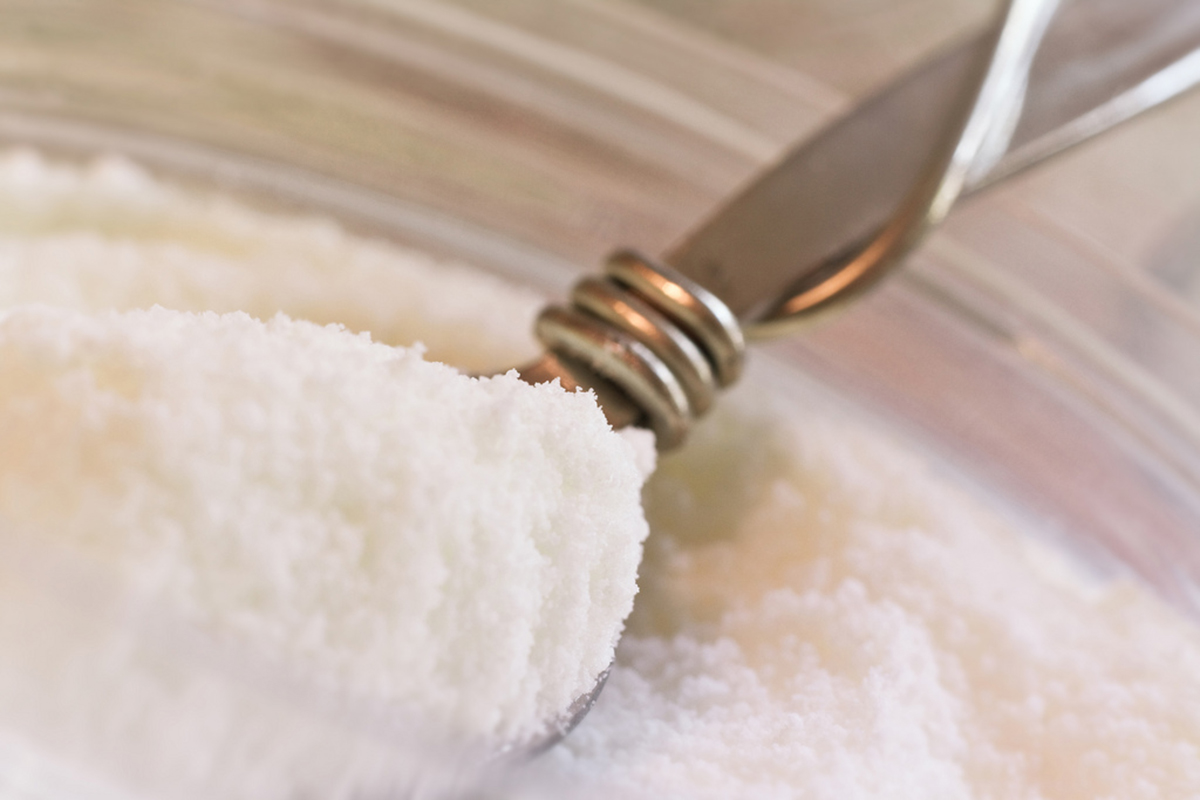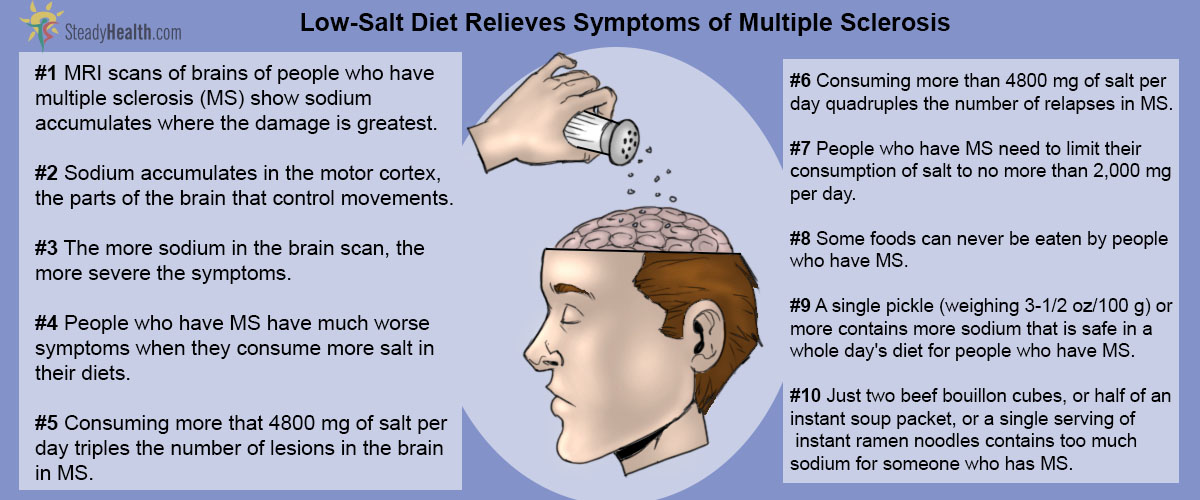Researchers have serious challenges in evaluating the effectiveness of dietary changes in the management of multiple sclerosis, also known as MS.
MS is a condition of natural remissions and relapses. Symptoms sometimes get better no matter what MS patients do, and symptoms sometimes get worse no matter what MS patients do. For that reason, it is a good thing to be cautious about intepreting the benefits or problems associated with a medication, a medical therapy, a nutritional supplement, or a change in diet. New basic research into the biology of the MS-affected brain, however, suggests that sodium restriction may be very useful in controlling the symptoms of MS.
MS-Affected Brain Soaks Up Sodium, Brain Scans Reveal
Scientists at the Aix-Marseille Université in France conducted brain scans (MRI) in 20 patients who had primary progressive MS, 9 patients who had secondary progressive MS, and 15 controls for comparison. The scans measured total sodium content in gray matter, white matter, and lesions in the brain, the lesions caused by the disease.
Sodium levels were not as high in the brains of patients whose MS was in remission, or in the brains of people who did not have the disease. The MRI scans revealed that sodium levels increased in regions of the brain most clearly associated with MS, the premotor, primary motor, and Somatosensory cortices, the cingulate, prefrontal, and visual cortices, and the corpus callosum, thalamis, cerebellum, and brainstem. Higher sodium levels in the anterior prefrontal cortex and premotor cortex were associated with greater disability from the disease.
Indicator of Disease, or Cause of Disease?
The French researchers concluded that higher sodium levels in the brain were a clear indicator of the progression of MS, but correlation is not the same as causation. It is not possible to conclude from the findings that the brain accumulates sodium during MS that sodium is a cause of MS. However, other research suggests that the relationship is causative, and that is not "sodium" that drives MS and other autoimmune diseases, but rather "sodium chloride," or table salt, in the diet.
Publishing their findings in the prestigious journal Nature, scientists in the departments of neurology and immunobiology at the Yale University School of Medicine found that high salt levels (that is, high levels of sodium chloride) increased the production of a highly specialized kind of white blood cell known as the Th17 cell. These white blood cells are helper T cells that produce an inflammatory chemical known as interleukin-17, or IL-17. This chemical interacts with brain cells to "turn on" a gene that tells the brain cell it is time to die.
See Also: Hidden Danger of Salt in Your Food
Sodium accumulates in parts of the brain most affected by MS, and salt stimulates the immune system to destroy cells in the parts of the brain most affected by MS. But does eliminating salt from the diet reduce symptoms of MS?
Low-Sodium Diets Seem To Best For MS
While the evidence for reducing dietary for reducing the frequency and severity of symptoms of MS is not overwhelming, it is strong. Scientists at the Fundación para la Lucha contra las Enfermedades Neurológicas de la Infancia in Buenos Aires counted lesions in brain scans of 52 MS patients, and then asked them for diet journals to determine the amount of salt they consumed. The Argentinian scientists found that for each additional gram of salt in the daily diet, MS patients had on average 3-1/2 times as many lesions in the brain. MS patients who consumed more that 4.8 grams of salt per day were found to suffer relapses 4 times more often than MS patients who followed a low-salt diet, 2 grams per day.

If you have MS, you probably never want to eat:
- Hot sauce packets. Just 2/3 of a packet usually contains a full day's allowance of salt.
- Beef bouillion cubes. Just two cubes contain an entire day's allowance of salt.
- Chicken bouillon cubes. Just three cubes contain an entire day's allowance of salt.
- Soup from soup mix. Although different brands have different levels of sodium, the most popular brand contains a day's worth of sodium in half of an individual serving packet.
- Tofu. Surprisingly, just 2 oz (56 grams) of firm tofu contains a day's worth of sodium.
- Pork rinds. Just 2 oz (56 grams) contains a day's worth of sodium.
- Bacon (sorry). Just 3 oz/84 grams of fried bacon contains a day's worth of salt.
- Ramen noodle soup mix. One package contains a days' worth of salt.
- Instant grits. Two 1-1/2 oz packets contain a day's worth of salt.
- Pickles. Most 4 oz (112 gram) pickles contain a day's worth of salt.
- Italian dressing and Italian vinaigrettes. A third of a cup (80 ml) of Italian dressing provides a day's worth of sodium.
- Pepperoni, canned pork products, processed cheese, pancakes, pickled peppers, and pretzels are all high in salt. About a 3-1/2 oz (100 gram) serving provides all the sodium that should be consumed in an entire day.
See Also: Twenty-Five Foods That You Probably Didn't Realize Are Too High in Salt
It isn't hard to avoid the foods on this list. It isn't necessary to buy expensive, strange foods to replace them. It's only necessary never, ever to eat any of these high-salt foods to make a major improvement in the average diet of a MS patient.
If you at least avoid these high-salt foods, it may not be necessary to avoid table salt and salt in cooking altogether, all less is always better. Canned foods, chips, dips, and snack foods are best avoided, too, but eliminating these easy to avoid problem foods may make a huge difference in the course of MS.
- Kleinewietfeld M1, Manzel A, Titze J, Kvakan H, Yosef N, Linker RA, Muller DN, Hafler DA. Sodium chloride drives autoimmune disease by the induction of pathogenic TH17 cells. Nature. 2013 Apr 25.496(7446):518-22. doi: 10.1038/nature11868. Epub 2013 Mar 6.
- Maarouf A, Audoin B, Konstandin S, Rico A, Soulier E, Reuter F, Le Troter A, Confort-Gouny S, Cozzone PJ, Guye M, Schad LR, Pelletier J, Ranjeva JP, Zaaraoui W. Topography of brain sodium accumulation in progressive multiple sclerosis. MAGMA. 2014 Feb
- 27(1):53-62. doi: 10.1007/s10334-013-0396-1. Epub 2013 Aug 3.PMID: 23907269.
- Mindmap by steadyhealth.com
- Photo courtesy of Nomadic Lass by Flickr : www.flickr.com/photos/nomadic_lass/5948476175



Your thoughts on this